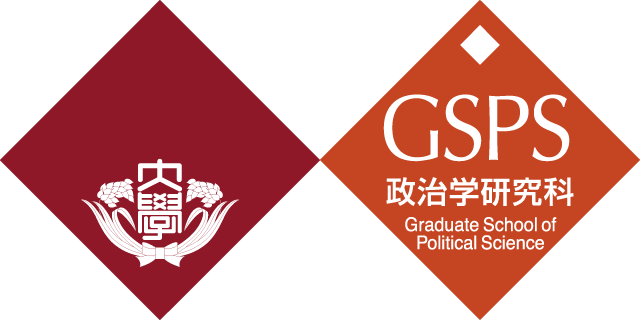- About the School
- Overview
Overview

International Prominence
Since its establishment in 1951, Waseda University’s Graduate School of Political Science (GSPS) has produced hundreds of graduates who have gone on to contribute to society in a diverse array of fields. Waseda University has consistently ranked among the top 100 universities worldwide in the field of politics in the past decade (and among the top 50 universities in 2019 and 2020), according to the QS World University Ranking. Waseda University also receives the largest amount of Grants-in-Aid for Scientific Research (科研費) in political science from the Japanese Society for the Promotion of Science.
The GSPS comprises a highly-regarded faculty with academic credentials from the most prestigious universities in Japan and overseas, and an international student body with a range of undergraduate educational backgrounds. The GSPS offers masters and doctoral degrees in political science providing both English-based and Japanese-based instruction. Graduate students may take courses in one or both languages and may write their thesis/dissertation in either language.
Fields of Study
Research and education at the GSPS is organized into four fields of study:
● Political Methodology and Political Analysis
● Political Thought and Political History
● Comparative Politics
● International Relations
In each of these fields, our faculty produce research that is influential internationally and offer research guidance and cutting-edge methodological training to our Master’s and Doctoral students. In addition to our research and education in these four fields of political science, we also offer Master’s programs in Journalism and Global Public Policy, but these programs are only available in Japanese. For more information about these programs, please refer to our website in Japanese.
At the GSPS, we encourage collaboration across these fields and promote an approach to research that transcends disciplinary boundaries. Thus, the GSPS offers an environment for studying political science in a manner both highly specialized and broadly comprehensive.
From Normative Political Philosophy to Positive Political Science
Waseda University’s Graduate Program in Political Science is built upon a solid foundation in both normative political philosophy and positive political science. At the GSPS, we acknowledge that most positive studies of politics have important normative implications for policy and most normative prescriptions of political philosophy are constrained by the political institutions and processes that positive research investigates.
To support leading research and fundamental education, we embrace the multifaceted approaches to and methodologies of political science. The GSPS is designed to equip graduate students early in their academic careers with the basic methodological tools of statistics and game theory along with a firm understanding of normative political philosophy. This is why our graduate program requires every entering student to take three methodology courses: Research Methods in Political Science (Empirical Analysis), Research Methods in Political Science (Formal Models), Research Methods in Political Science (Normative Studies). These foundational methodology courses are taught by faculty who received their methodological training in internationally renowned institutions. After graduate students acquire a firm foundation in political science methodology and normative political philosophy, they move forward to apply these skills in their substantive fields of inquiry. They deepen their knowledge by taking other graduate courses and participating in graduate seminars organized by their advisors.
The end result is that each graduate student can be expected to transform themselves into an independent researcher with the potential to make an academic contribution that expands our knowledge of politics.
Philosophy, Politics and Economics (PPE)
A pertinent characteristic of the Graduate School of Political Science at Waseda University is its position within the Faculty of Political Science and Economics; thus, the faculty of the Graduate School of Political Science, the Graduate School of Economics and the undergraduate School of Political Science and Economics work closely together in education and research. In this environment, graduate students of political science can study both positive political science and normative political philosophy in close connection with economics – a field with which the two main approaches to the study of politics (namely, positive and normative) are closely connected. This offers a tremendous advantage to our students and faculty, as the demand for the integrated study of philosophy, politics, and economics rises globally. Understanding our highly complex world calls for the transcendence of traditional academic boundaries and the inclusion of multiple perspectives in a truly interdisciplinary framework.
Continuing Innovation
The world is rapidly changing. At the GSPS, we are tackling new challenges head on through continued innovation in research and education. In doing so, we provide a professional education at the Master’s level that will equip graduates with the essential tools and working knowledge that they will need as professionals in whatever field they pursue. We also maintain an educational structure that is both systematic and cutting-edge for graduate students pursuing academic careers through our Doctoral Program.
